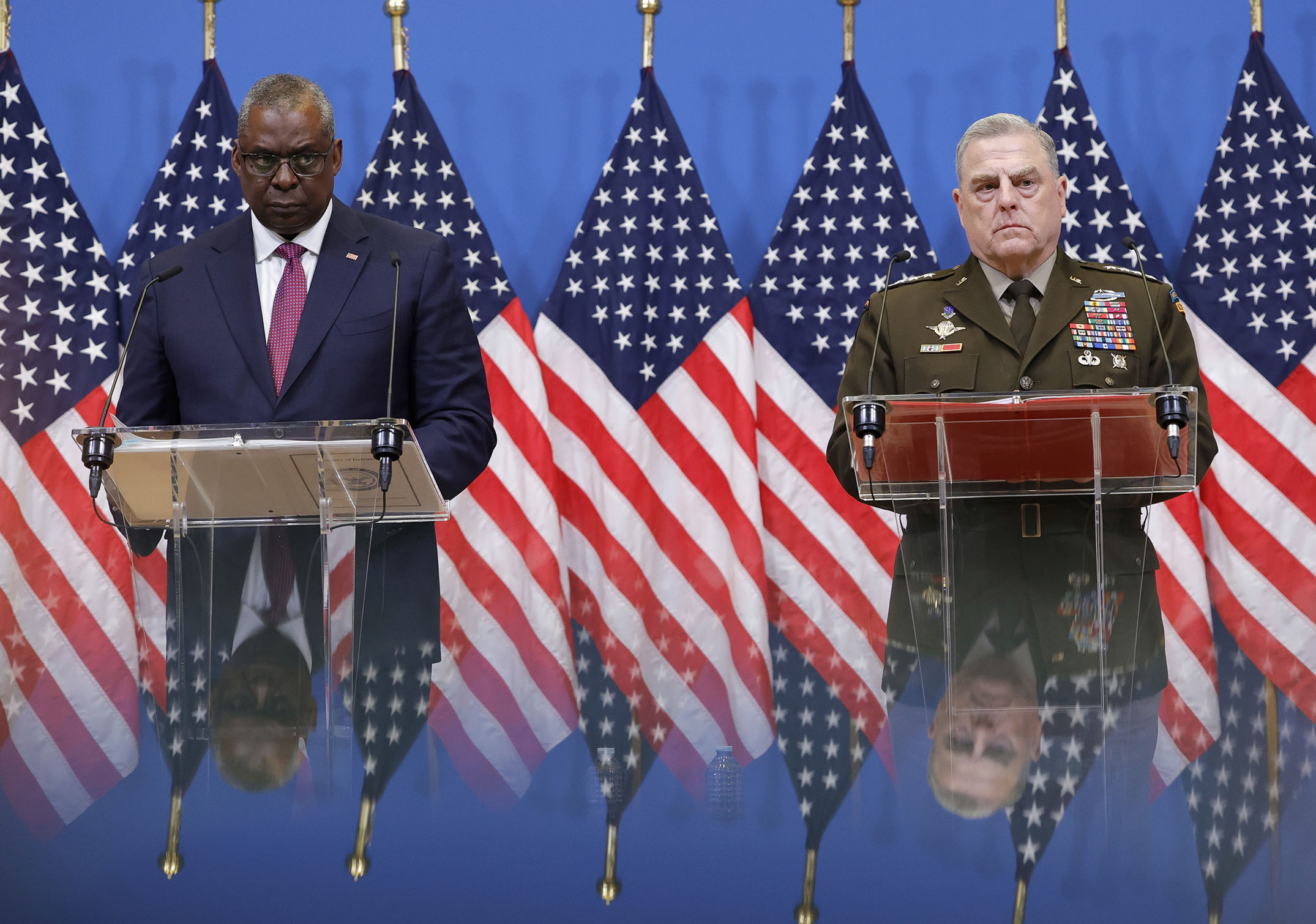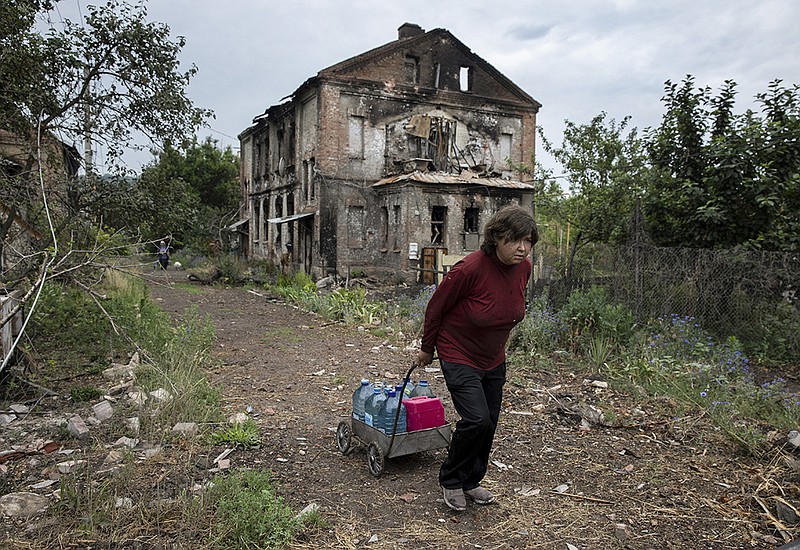President Joe Biden on Wednesday said the United States will deliver another $1 billion worth of military equipment to Ukraine, including weapons to defend the country's coast, additional artillery, and more ammunition for the rocket systems to defend against Russian aggression in the eastern part of the country.
Biden said in a statement that he informed President Volodymyr Zelenskyy of the new weapons during a 40-minute call Wednesday morning.
"The bravery, resilience, and determination of the Ukrainian people continues to inspire the world," Biden said in the statement. "And the United States, together with our allies and partners, will not waver in our commitment to the Ukrainian people as they fight for their freedom."
Zelenskyy thanked Biden for the new aid package.
"The security support of the United States is unprecedented," he said, reporting on a phone call the two leaders held earlier Wednesday. "It brings us closer to a common victory over the Russian aggressor."
Defense Secretary Lloyd Austin, at a meeting in Brussels with other Western officials from NATO countries, said that the U.S. aid would include sophisticated weaponry such as guided rocket launcher systems and 18 more long-range M777 howitzers. Ukrainian officials have emphasized that they need far-reaching weapons to counter some of Russia's advantages in battle in the eastern Donbas region.
"These are key investments in Ukraine's long-range fire capabilities," Austin said in Brussels, saying the weapons would be "crucial to Ukraine's efforts to repel Russia's assault in the Donbas."
Austin said that other countries would also make new commitments. He said Germany would offer three long-range artillery rocket systems with ammunition, as Britain has also done. Slovakia is promising helicopters and ammunition, and Canada, Poland and the Netherlands promised more artillery.
The White House also announced that Biden approved an additional $225 million to provide Ukrainians with drinking water, medical supplies, food, shelter and other humanitarian assistance.
"We can't afford to let up, and we can't lose steam," Austin told a meeting in Brussels of nearly 50 countries known as the Ukraine Defense Contact Group. He praised the flow of tanks, missiles and artillery provided to Ukraine so far, but said it was not enough, adding, "The stakes are too high."
Ukraine is struggling to hold off a Russian onslaught in the east, with Moscow's forces on the verge of capturing the strategic city of Sievierodonetsk. Kyiv has voiced frustration that many of the heavy weapons promised by its Western allies have not arrived, as Russia uses its superior artillery to seize control of more of the eastern Donbas region.
The comments came as administration officials say they are increasingly looking at options for how to handle a sustained conflict -- and whether a cease-fire, or a formal armistice similar to the one reached in Korea 70 years ago, would help or hurt the Ukrainian cause.
Their analysis, officials say, has been fairly pessimistic. They fear that Russian President Vladimir Putin might use a cessation of hostilities to rebuild his military, and perhaps seek another opportunity to take all of Ukraine, his objective when the war began on Feb. 24.
For now, officials say, they are preparing for long-term support of the Ukrainian government, and more supply of weapons. But officials are clearly concerned that both U.S. public interest in the conflict and European unity may wane. They are looking for ways to reinvigorate that interest, including inviting Zelenskyy to attend the NATO summit in Madrid at the end of June.
Zelenskyy also said he has accepted the invitations to speak at the NATO and Group of Seven summits at the end of the month.
"Russia is using its long-range fires to try to overwhelm Ukrainian positions," added Austin, a retired four-star Army general. "So we must intensify our shared commitment to Ukraine self-defense, and we must push ourselves even harder to ensure that Ukraine can defend itself."
RUSSIAN OFFENSIVE
On the battlefield, the Russian military said it used long-range missiles Wednesday to destroy a depot in the western Lviv region of Ukraine where ammunition for NATO-supplied weapons was stored, and the governor of a key eastern city acknowledged that Russian forces are advancing in heavy fighting.
The battle for Sievierodonetsk in Ukraine's eastern Donbas area has become the focus of Russia's offensive in recent weeks.
Russia-backed separatists accused Ukrainian forces of sabotaging an evacuation of civilians from the city's besieged Azot chemical plant, where about 500 civilians and an unknown number of Ukrainian fighters are believed to be sheltering from missile attacks. It wasn't possible to verify that claim.
Russian officials had announced a humanitarian corridor from the Azot plant a day earlier, but said they would take civilians to areas controlled by Russian, not Ukrainian, forces.
The Ukrainian governor of Luhansk, Serhiy Haidai, told reporters that "heavy fighting in Sievierodonetsk continues today as well." The Luhansk and Donetsk regions make up the Donbas.
The situation in the city is getting worse, Haidai said, because Russian forces have more manpower and weapons. "But our military is holding back the enemy from three sides at once," he added.
In the Lviv region near the border with NATO member Poland, Russian forces used high-precision Kalibr missiles to destroy the depot near the town of Zolochiv, Russian Defense Ministry spokesman Igor Konashenkov said. Konashenkov said shells for M777 howitzers, a type supplied by the United States, were stored there. He said four howitzers were destroyed elsewhere and that Russian airstrikes also destroyed Ukrainian "aviation equipment" at a military aerodrome in the southern Mykolaiv region.
Ukrainian officials did not immediately comment on the Zolochiv strike.
While focusing most of their attacks on eastern Ukraine, where they are trying to capture large swaths of territory, Russian forces have also been hitting more specific targets elsewhere, using high-precision missiles to disrupt the international supply of weapons and destroy military infrastructure. Civilian infrastructure has been bombarded as well, even though Russian officials have claimed they're only targeting military facilities.
In recent days, Ukrainian officials have spoken of the heavy human cost of the war, with Kyiv's forces outgunned and outnumbered in the east.
"During the 112 days of this war, the Ukrainian army has proved that courage and wisdom on the battlefield, together with the ability to tactically outmaneuver the enemy, can have a significant result, even despite the Russian army's significant advantage [in its] number of soldiers and equipment," Zelenskyy said in his nightly video address.
"Of course we are doing everything we can to overcome this advantage. Every day I fight for Ukraine to receive the weapons and equipment we need."
Meanwhile, Dmitry Medvedev, the deputy chair of Russia's Security Council, ominously suggested that Russia is intent on not just claiming territory but eliminating Ukraine as a nation. In a Telegram post, he wrote that he saw Ukraine wants to receive liquefied natural gas from its "overseas masters" with payment due in two years.
He added: "But there's a question. Who said that in two years, Ukraine will even exist on the map?"
Mykhailo Podolyak, an adviser to Zelenskyy, responded on Twitter: "Ukraine has been and will be. Where will Medvedev be in two years? That's the question."
TIGHTENING PIPELINE
Meanwhile on the economic front, Gazprom, the Russian gas monopoly, said Wednesday that it was further tightening natural gas supplies through a key pipeline to Germany. The company said flows through the pipeline, Nord Stream 1, would be cut by 60%, a day after announcing a 40% reduction.
Gazprom said the cuts were necessary because a turbine for a compressor station in northwestern Russia was sent for repairs and hadn't returned in time. Siemens Energy, the German manufacturer of the turbine, said the turbine had been sent to Canada for maintenance at a specialized facility in Montreal and that its return had been delayed because of Ottawa's sanctions on Russia.
Siemens Energy said it was trying to resolve the situation.
The German government, however, said it suspected that Gazprom might be using the delays from repairs to score political points and make it more difficult for Germany and Europe to achieve their stated goals of building a buffer of stored gas for winter when demand for the fuel will increase.
"The Russian side's justification is simply a pretext," Robert Habeck, Germany's economy minister, told reporters in Berlin on Wednesday. "It is obviously the strategy to unsettle and drive up prices."
Adding to worries, Eni, the Italian energy company and a major Gazprom customer, said Wednesday that the Russian company said it would cut gas supplies by about 15% for the day. An Eni spokesperson said Gazprom had not given reasons for tightening supplies.
At present there does not seem to be a risk of immediate shortages. Germany and other countries have been importing an excess of gas to fill storage facilities. Habeck said enough gas could be found on the market, although at high prices.
Until Tuesday, the gas situation in Europe seemed relatively stable despite the war in Ukraine. Storage across the European Union had built up to over 50%, about 10% better than a year ago. Analysts even expressed concerns that European utilities might be stuck with too much gas.
Gazprom's moves over the past two days have rekindled worries about a major cutoff of supplies to Europe. After a sharp increase Tuesday, gas prices rose about 25% on the TTF exchange to about $126 a megawatt-hour, about six times the level of a year ago.
It is standard industry practice to sock away gas in storage tanks in the summer, when demand is low and gas is relatively cheap, and then burn it in the winter. Last year, however, prices never dropped to low levels, and less gas than usual went into storage. Some analysts say that Gazprom deliberately kept the levels in its facilities in Germany low and otherwise tried to influence markets in the lead-up to Russia's invasion of Ukraine.
Information for this article was contributed by Steven Erlanger, Michael D. Shear, Eric Schmitt, Stanley Reed and David E. Sanger of The New York Times and John Leicester and Yuras Karmanau of The Associated Press.
 Defense Secretary Lloyd Austin (left) and Chairman of the Joint Chiefs of Staff Gen. Mark Milley speak at a news conference Wednesday at NATO headquarters in Brussels. Austin said $1 billion in new aid to Ukraine would include weapons such as guided rocket launcher systems and 18 more long-range M777 howitzers. (AP/Olivier Matthys)
Defense Secretary Lloyd Austin (left) and Chairman of the Joint Chiefs of Staff Gen. Mark Milley speak at a news conference Wednesday at NATO headquarters in Brussels. Austin said $1 billion in new aid to Ukraine would include weapons such as guided rocket launcher systems and 18 more long-range M777 howitzers. (AP/Olivier Matthys)Gallery: Images from Ukraine, month 4
